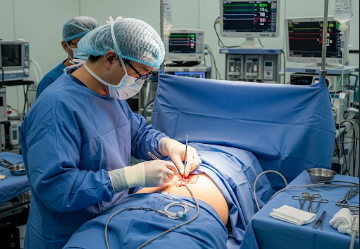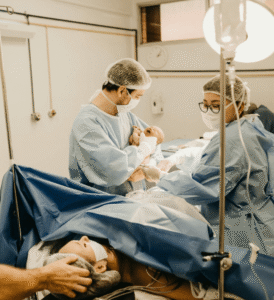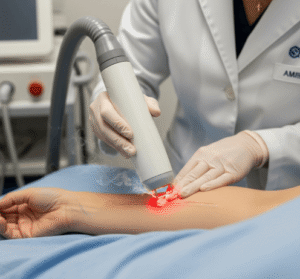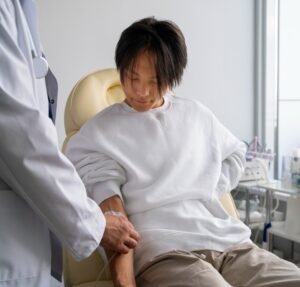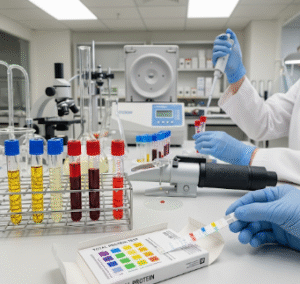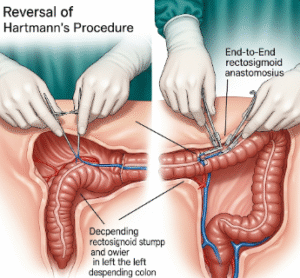Overview
Adrenalectomy is a surgical procedure to remove one or both adrenal glands, which are located above the kidneys and produce hormones essential for body functions, including cortisol, aldosterone, adrenaline, and noradrenaline. This procedure is primarily performed to treat adrenal tumors, hormone-producing adenomas, pheochromocytomas, or cancerous lesions.
In Korea, adrenalectomy is performed in advanced endocrine surgery centers by experienced surgeons using laparoscopic, robotic-assisted, or open surgical techniques. The procedure aims to remove the diseased adrenal gland safely while minimizing complications, with postoperative care focused on hormonal balance and recovery.
What is Adrenalectomy?
Adrenalectomy involves surgically removing an adrenal gland to treat tumors or abnormal hormone secretion.
Types of adrenalectomy:
- Laparoscopic Adrenalectomy:
- Minimally invasive approach using small incisions and camera-guided instruments
- Shorter recovery, less pain, and smaller scars
- Robotic-Assisted Adrenalectomy:
- Enhanced precision using robotic arms and 3D visualization
- Useful for complex or large tumors
- Open Adrenalectomy:
- Traditional approach with larger incision
- Reserved for large, invasive, or cancerous tumors
Key points:
- Treats benign or malignant adrenal tumors
- Corrects hormone overproduction (e.g., Cushing’s syndrome, Conn’s syndrome, pheochromocytoma)
- Minimally invasive techniques reduce hospital stay and recovery time
What are the benefits?
- ✅ Removes adrenal tumors safely
- ✅ Corrects hormonal imbalances causing medical symptoms
- ✅ Minimally invasive techniques offer faster recovery and less postoperative pain
- ✅ Reduces risk of tumor spread in malignant cases
- ✅ In Korea, surgeons combine advanced imaging and surgical expertise for optimal outcomes
- ✅ Enables long-term management of adrenal disorders and improved quality of life
Procedure Details
1) How should I prepare for Adrenalectomy?
- ➤ Preoperative evaluation: Blood tests, hormonal assays, CT or MRI imaging
- ➤ Discuss medications, allergies, and existing medical conditions
- ➤ Fasting as instructed before anesthesia
- ➤ Pre-surgery counseling about procedure, risks, and hormonal management post-surgery
- ➤ Arrange support at home for recovery, especially if both adrenal glands are removed
2) What happens during the procedure Adrenalectomy?
- ✅ Performed under general anesthesia
- ✅ Laparoscopic or robotic approach: Small incisions made; camera and instruments inserted
- ✅ Diseased adrenal gland is identified, dissected, and removed carefully
- ✅ In open adrenalectomy, a larger incision is made to access the gland
- ✅ Blood vessels and nearby structures are carefully managed to reduce bleeding
- ✅ Duration: 1–3 hours depending on technique and tumor size
3) What happens after Adrenalectomy?
- ➤ Patients monitored in recovery room for vital signs and hormonal stability
- ➤ Pain managed with analgesics
- ➤ Early mobilization encouraged to reduce risk of complications
- ➤ Hormonal replacement may be needed temporarily or permanently if both adrenal glands are removed
- ➤ Follow-up with hormonal tests and imaging to monitor recovery and detect recurrence
Risks / Benefits
Potential Risks:
- ➤ Bleeding or hematoma
- ➤ Infection at the incision site
- ➤ Hormonal imbalance requiring temporary or lifelong replacement therapy
- ➤ Injury to nearby organs (kidneys, spleen, liver)
- ➤ Rare complications: blood clots, hernia at incision site, or anesthesia-related issues
Benefits:
- ✅ Treats tumors effectively and prevents further complications
- ✅ Corrects overproduction of hormones
- ✅ Minimally invasive techniques reduce hospital stay and recovery time
- ✅ In Korea, surgical precision ensures high success rates and minimal complications
Recovery and Outlook
- Hospital stay: Usually 2–5 days, shorter for laparoscopic approaches
- Activity: Gradual return to normal activity; avoid heavy lifting for 4–6 weeks
- Follow-up: Regular hormonal assays and imaging to monitor adrenal function and detect recurrence
- Pain management: Mild discomfort is managed with prescribed medications
- Long-term outcome: Most patients recover well and experience improved symptoms, hormonal balance, and quality of life
When To Call the Doctor
- ➤ Persistent bleeding or swelling at the surgical site
- ➤ Fever or signs of infection
- ➤ Severe abdominal or back pain
- ➤ Symptoms of adrenal insufficiency (fatigue, dizziness, low blood pressure)
- ➤ Any unusual symptoms post-surgery
Best Korea Option / Process
- ✅ Korea provides advanced endocrine surgery centers with minimally invasive and robotic options
- ✅ Experienced surgeons specialize in adrenal tumors, pheochromocytoma, and complex endocrine cases
- ✅ Postoperative care includes hormonal management, pain control, and rehabilitation guidance
- ✅ International patients benefit from VIP services, English-speaking staff, and coordinated care
- ✅ High precision and modern technology ensure safe surgery, faster recovery, and optimal outcomes

